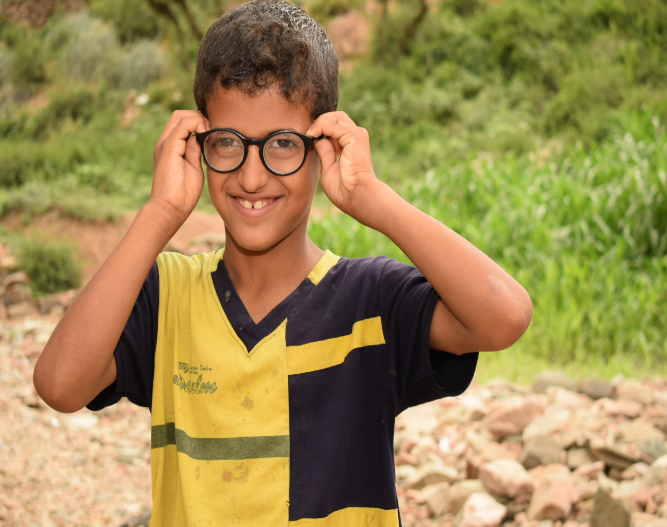Speeches Shim

Assistance helps children overcome social barriers to education
Abdul is a 10-year-old boy who dropped out of school in the first grade. “I had no friends,” he explains. “My schoolmates used to make fun of me, and call me bad names because of my eye.”
Since birth, Abdul’s right eye has been bigger than his left eye, a problem that led to acute nearsightedness, and caused him to be a victim of bullying. He became shy and introverted, ultimately refusing to go back to school, despite his father’s many attempts to convince him of the importance of education.
Abdul lives with his parents and three younger siblings in the Almaqatera district of Lahij governorate, in southwest Yemen. Almaqatera district is made up of remote villages that lie on top of mountains, with rough rugged roads and a lack of basic facilities, such as hospitals and clinics.
Abdul’s father, who works as a mechanic, struggled for many years to address his son’s eyesight, and could not afford to take him to a specialist in the city.
However, since September of 2019, Abdul’s village has partnered with Save the Children’s USAID-funded Education in Emergencies project as one of 102 non-formal education sites across Aden and Lahij governorates. The program identifies and enrolls out-of-school children and youth into accelerated learning and remedial classes to help children continue their education.
After joining the class in his village, the psychosocial support team noticed Abdul needed additional support for his eyesight. He received an optical checkup and became one of 55 children provided with suitable eyeglasses through the project.
Since then, Abdul is feeling much better, according to his father. “He became more confident,” his father says. “With his new glasses, he now can see clearly. He started to go out more often, and play with other children in the village.”
“I like to play with my new friends,” Abdul says, “We play football, racing, hide and seek, and many other games. I can’t wait to go back to the class. Now I can see clearly and can play with my classmates. Also, I will learn how to read properly from my teacher. When I grow older, I wish to become a mechanic like my father.”

Comment
Make a general inquiry or suggest an improvement.